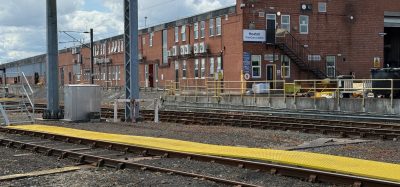Exporting Italian railway know-how and expertise around the world
Posted: 5 August 2014 | | No comments yet
Drawing up plans and designs, calling for tenders and performing works management, supervision and project management functions in respect of all kinds of infrastructure investments in Italy and worldwide are the major areas of operation in which Italferr, the engineering company within the FS Italiane Group, has been engaged since its inception in 1984. For Global Railway Review, Matteo Triglia – Managing Director of Italferr – explains that during these 30 years the company has been able to enhance the value of its staff’s extremely high levels of expertise, assuming responsibility for projects that have completely revolutionised the transport system in Italy, such as the construction of the HS/HC railway lines – one of the biggest and most demanding projects that the Group and Italy itself has undertaken – and the upgrade and expansion of Italy’s major urban railway hubs…
In recent years we have been exporting our know-how and the highly specialised technical experience that we have gained while working on major Italian projects, tendering for important international contracts and managing, in the space of just a few years, to be ranked among the leading engineering firms in the world. This international success has been brought about by a number of factors: expert marketing activities and a consistent presence in places that are crucial for our business (Italferr has eight offices outside Italy, in Belgrade, Bucharest, Abu Dhabi, Istanbul, Muscat, Doha, Algiers and Riyadh), an aggressive pricing policy and an unceasing commitment to streamline and innovate its processes, putting it in a position to offer its customers a broad spectrum of services ranging from project feasibility studies, work assignment activities and project management, through to the commissioning of railway infrastructure. A growing number of foreign customers now ask us to cooperate with them so that they can acquire our specialist know-how through the provision of complex and demanding training courses for their current and future management staff. We are currently engaged in projects in countries that include Saudi Arabia, Oman and Algeria.
It also has to be added that one of our distinctive skills is our ability to meet requests and requirements deriving from diverse environmental and cultural situations, each characterised by their own different and particular problems that have to be dealt with and resolved.
It is thanks to all this that Italferr has been awarded some very important contracts in various countries, such as Saudi Arabia, Qatar, Oman and Ethiopia.
More specifically, in Saudi Arabia Italferr was selected by the Saudi Railway Company (SAR), from a number of international engineering firms, to draw-up the preliminary and the detailed plans for the new railway line (960km) that will link Riyadh and Jeddah, known as ‘The Saudi Landbridge Railway Project’.
The work assigned to us includes route planning and the plans and designs of the line’s superstructure, bridges, tunnels, stations, facilities for loading/unloading trains and handling containers, signalling (the new European Level 2 ERTMS system), telecommunications systems and an environmental impact assessment.
The contract was signed in July 2013 by the Saudi Public Investment Fund (PIF) and will be managed by the Saudi Railway Company. The planning stage is to be completed within 14 months.
In 2013 we started developing the plans for the Red Line Underground in the Doha metro system in Qatar, which are to be completed by the end of 2014. In this project, Italferr is the planning arm of a consortium of international engineering firms headed by Impregilo. Italferr is thus responsible for planning the rail route, civil engineering works (tunnel approach structure), RAMS engineering, Value Management Engineering, System Assurance, Requirements Management and Interface Management and is also involved in planning the mechanical and electrical systems.
In the context of the Doha metro system project, we were appointed by the aforesaid consortium to carry out the preparatory work required to tender for the Red Line Elevated contract.
We have also been engaged to work in Oman. On 5 February 2014 we signed ‘The National Railway Project’ contract for the preliminary planning of the new railway system in the Sultanate of Oman, which is expected to take around 25 months. It regards an approximately 2,244km-long railway line that will link the area bordering on the UAE to Muscat and the southern part of the country to the port of Ad Duqm and Salalah and the border with Yemen. I want to point out that Oman’s national rail network is intended to be a key element in the modernisation of the freight distribution system in the Sultanate. Most of the freight transport in that country involves the transportation of containers between ports and inter-modal hubs and raw materials from ports to manufacturing centres and the export of raw materials and semi-processed goods to countries in the Persian Gulf.
This project also involves a training scheme under which Italferr, working together with the College of Engineering at La Sapienza University in Rome, will provide groups of young Omani engineers with technical know-how.
With regard to Africa, Italferr signed a contract in Ethiopia last January for consultancy services regarding the management and running of both the new railway linking Ethiopia’s capital and the port of Djibouti and the city’s new light-rail transit system. Said consultancy services, which went into operation in February 2014, will be provided for a period of approximately eight months.
By obtaining that contract (worth €1.233 million) we have laid the foundations for a policy of expansion in the African continent, where local governments, international financing institutions and private companies are planning to invest enormous sums of money in the development of transport infrastructure.
Our operations will embrace a number of different areas, ranging from the development of a railway system Master Plan and guidelines for managing and running railways, through to drafting manuals, setting standards, establishing regulations, overseeing the institutional development of the Management and Services Department, studying the current organisation system and planning an organisation system fitting the context in which the customer, the Ethiopian Railway Corporation, operates and will be operating in the short- and medium-term, formulating technical specifications, drafting a legislative and regulatory framework for railway operations, setting up an operations and services management system and developing and coordinating training schemes.
Italferr is also operating in Albania, Algeria, Croatia, Egypt, Serbia, Macedonia, Turkey and Brazil.
In Albania, the Municipality of Tirana has appointed us to conduct the feasibility study for the city’s multi-modal terminal, a project funded by the European Bank for Reconstruction and Development (EBRD). The contract, which was executed in Tirana in 2012 by Tirana’s Mayor, Lulzim Basha, and the consortium headed by us, together with the local offices of CMS Adonnino Ascoli & Cavasola Scamoni and A&B Business Consulting, regards a number of services: the collection and updating of data and studies on existing traffic; the planning of the terminal and identification of relating services; the quantification of costs and of revenues generated by the services provided to passengers; the analysis of the financial economics of the terminal system; the drafting of pre-qualification and tender procedures; the drafting of the text of the Licence to build, manage and run the terminal.
The work involved in the feasibility study and the drafting of the licence has been brought to conclusion. The international call for tenders, in respect of which the consortium headed by Italferr will provide the Municipality of Tirana with support services, is expected to be published by the end of May.
In Algeria, under a five-year contract awarded by ANESRIF – Agence Nazionale d’Etudes et de Suivi de la realisation des Investissements Ferroviaires (the Algerian Government agency for implementing the railway investments programme), we are providing technical services in relation to the planning of new lines, the management of calls for tender and the supervision of the works involved in bringing the infrastructure investment programme in Algeria to completion. The value of this development programme is in the region of U.S. $30 billion. Said services are directed at the implementation and completion of an ambitious programme of investments in infrastructure, further to which the Algerian railway system will be radically modernised thanks to a vast number of improvements being made, the most important of which include: the increased capacity of the ‘Ligne Rocade Nord’ (Morocco–Tunisia line), the reorganisation of the railway hubs in Algiers, Oran and Constantine, the building of new lines in the High Plains area and axes heading south. Italferr has also provided ANESRIF with precious support in recent years by taking part in important decision-making processes concerning matters of a technical, operational and legal nature, producing, inter alia: a preliminary study of the new (1,200 Km) high-speed East–West line (‘nouvelle Ligne GV’); the preliminary plans for the electrification of the coastal ‘Rocade Nord’ line; tools for standardising the drafting of plans, the uniform submission of tenders and subsequent planning operations (planning manual); tools for standardising works management (execution manual). We are also engaged in training ANESRIF staff, in both Algeria and Italy, to enable its engineers to work autonomously. Our consultancy work in Algeria will be concluded in May 2014, since the aforesaid five-year contract, which started in February 2008, was extended for another year.
Italferr is also currently engaged in planning the Hrvatski Leskovac–Karlovac section of the railway in Croatia, which runs for approximately 45km along the V/b Corridor. The contract was executed in Zagreb in 2012 by and between Italferr, representing the consortium it formed with Technital and IRD Engineering, and the Croatian Railways (HŽ Infrastruktura). The contract is worth €5.5 million – 85% of which is financed by the European Union using IPA pre-accession funds – and the remaining 15% has been earmarked in the country’s budget. Our services will be rendered over a period of three years and, more specifically, involve drafting the final and the executive plans for doubling the track between Hrvatski Leskovac and Karlovac. They also include an environmental impact assessment, a transport study, a costs-benefits analysis of the works involved and a revision of the feasibility study to bring it in line with European standards.
This project will be brought to conclusion with the preparation of the works specifications, which the Croatian Railways will then use to apply to the European Commission for joint funding.
Again in the Balkans, Infrastructure Engineering Services (IES Doo), a new operating company in which italferr holds 100% of the share capital was set up in Serbia in 2012. That same year the company started working in connection with the revision of the Strategic Plan for modernising Serbia’s railway network, initially gathering together all the existing data and studies, backed up by a number of on-site technical inspections of the network, with the intent of obtaining an overall picture of the progress of the investments made in the railways sector. Work then continued with the revision of the transport model that had been formulated during the preparation of the General Transport Plan and the preliminary evaluation of the investment options intended to bring the transport offered in line with the demand for it. These elements enabled us to draft the new 2012-2021 Strategic Plan and the relating Investments Programme for 2012-2016. The Plan will have to also include proposals on the institutional reorganisation of the railways sector and an initial classification of the environmental issues connected with the Investments Programme. That Programme concerns the modernisation of 1,183km of the main network, consisting in Corridor X (the line that cuts across Serbia, linking Croatia and Macedonia) and its two branch lines (the X/b line towards Hungary and the X/c line towards Bulgaria) and the Belgrade–Bar axis. The assistance we are providing has involved the Serbian Railways and the Railways Directorate and, quite obviously, been supervised by the country’s Ministry of Transport. Our work on this project financed by the European Investment Bank will be brought to conclusion in May 2014.
Additionally, in Serbia and Macedonia, we have been assigned by the European Bank for Reconstruction and Development (EBRD) to monitor the works being carried out to modernise the superstructure along Corridor X, on certain sections of the track belonging to the Macedonian and Serbian networks. The provision of these services, funded by the Central European Initiative (CEI), commenced in October 2011 and should end in 2016.
More specifically, we started by checking the calls for tenders to upgrade the superstructure that the Macedonian and Serbian Railways had issued in 2011. The relevant contract provides for regular inspections of the construction sites to be opened along Corridor X, for approximately 100km in Serbia and 50km in Macedonia.
As work on the project progresses, the key reports prepared by the contractor and the works manager will have to be checked, with the ERBD being given progress reports on the sites and informed about any problems, until the lines in question are put into operation.
This commission enabled Italferr to enter the Macedonian market for the first time and position itself to tender for certain engineering contracts to be awarded shortly.
Two important European railway corridors cross Macedonia: Corridor X (which links Austria and Germany with Greece and Turkey) and Corridor VIII (which will connect Southern Italy and Bulgaria). In view of its position of a railway crossroads in the heart of the Balkans, Macedonia has started modernising its rail, road and logistics network with the support of the EU and major international financing institutions.
In 2010, the Egyptian Railways appointed us to develop the modernisation of the signalling system along Corridor 4 of the Egyptian infrastructure system that concerns, more specifically, the two Benha–Zagazig–El Ismalia–El Qantara–Port Said and Zagazig–Abu-Kebir sections, covering a total of 170kilometres. The first stage of this work will involve drafting the technical specifications of the new systems, preparing the tender documents and assisting the customer up to the point when the contract for carrying out the executive planning stage and putting the systems into operation is awarded.
Another project on which Italferr is currently working is that regarding the railway link between Esenboga International Airport and Ankara in Turkey. It is part of the plan for modernising and developing infrastructure not only in the city of Ankara, but throughout the country as well, and involves a feasibility study and the preliminary and final plans for an approximately 27km-long link between the airport in Esenboga and the country’s capital. It also provides for the planning of eight intermediate stations intended to serve one or more of the biggest areas of urban development in the city.
In addition to the Turkish Ministry of Transport, the Municipality of Ankara will be involved in this complete overhaul of the urban transport system.
In Brazil we have been appointed to provide technical assistance to Triunfo Partecipacoes e investimentos, one of the country’s leading public concessions management firms.
In recent years Italferr has endeavoured to establish its position in the foreign market and has achieved consistently higher results, especially in the last 36 months. At present, its turnover in relation to operations abroad account for 25% of total turnover, but according to the forecasts outlined in its 2014-2017 Industrial Plan, we are looking to obtain important new contracts that can increase that percentage, also in view of a gradual reduction of turnover from operations in Italy, where almost all of the most important projects have been completed.
Our current mission is thus to further consolidate our prime position in larger international markets. First of all, we intend to further strengthen our presence in the Middle East, which for us represents a very deep mine of opportunities.
In particular, we are very interested in Africa, since it ranks second to Asia in terms of the areas of the world with the highest rates of economic growth. Certain countries, known as the ‘African Lions’ (including Algeria, Ethiopia, Kenya, Uganda, Tanzania and Mozambique), are considered major economies due to rates at which their GDP is rising. The fact that they have so many natural resources at their disposal is prompting them to significantly develop their railway infrastructure.
South-East Asia and Latin America are also contemplated by our business development strategies.
In addition to India, which is planning to spend U.S. $100 billion on underground networks and overland railways over the next five years, Italferr is also focusing its attention on countries such as Thailand and Malaysia. Furthermore, the big urban transport and traditional and high-speed railway networks projects that are being planned for in South America, and especially in Brazil, Peru and Mexico, which is ranked among the eight economies having the highest growth rate over the next 10 years and the second largest in South America, are of potential interest to our company.
Another country that we keeping close watch on is Australia, since it is planning to invest resources amounting to over 100 billion Dollars in infrastructure over the next 10 years; we have actually already carried out a small assignment there.
Lastly, Russia and Montenegro deserve a mention; we have been operating in Montenegro since 2010, working on a number of assignments to draw up plans and draft technical/economic studies. We now have to decide on the next steps to be taken in order to consolidate the presence of Italian firms in the Balkans and be involved in the development of the Russian national rail network.
Biography
Matteo Maria Triglia has been Managing Director of Italferr since 8 October 2013 and is Deputy Chairman of IGI – Istituto Grandi Infrastrutture (Large Infrastructure Institute). The positions Matteo held within Gruppo Ferrovie dello Stato Italiane before being appointed Managing Director of Italferr include Investments Manager for RFI (Rete Ferroviaria Italiana) between 2007 and 2013 plus Maintenance Manager for RFI between 2000 and 2007. Matteo has also held the following positions over the years on the following Boards of Directors: (2009-2014) Chairman and Managing Director of TFB Tunnel Ferroviario del Brennero Finanziaria di Partecipazioni SpA; (2008-2013) Member of the Board of Directors of Stretto di Messina SpA (in liquidation); and (2007-2013) Member of the Board of Directors of LTF Lyon Turin Ferroviarie SAS. Matteo has a Degree in Electrical Engineering obtained from Turin Polytechnic in 1977.








